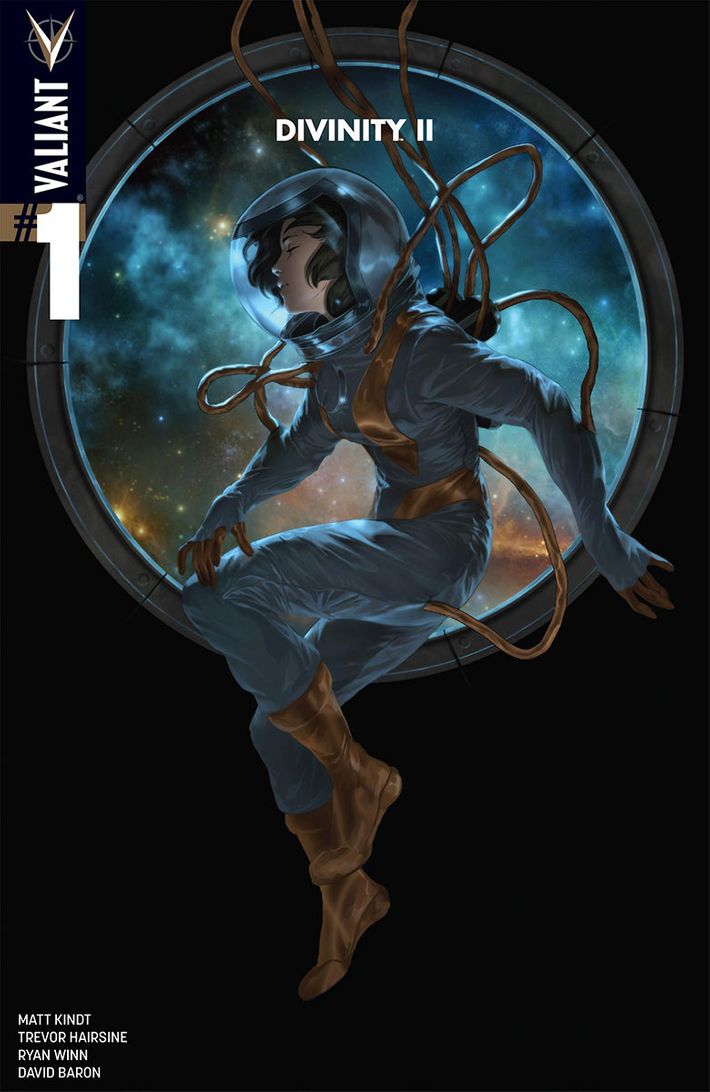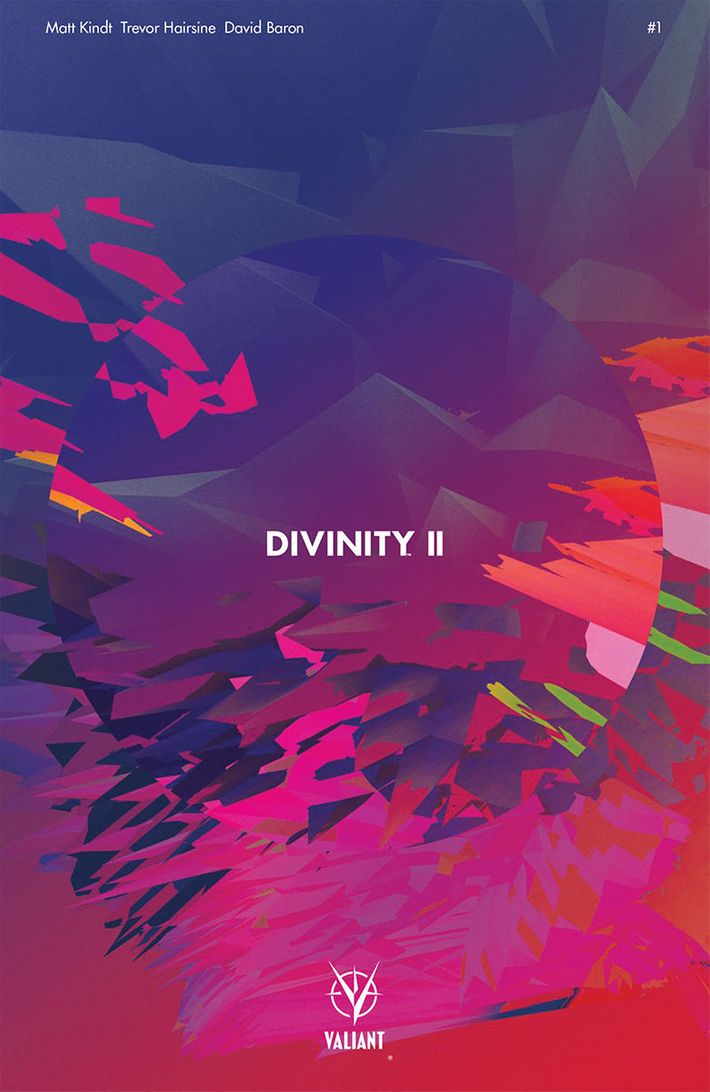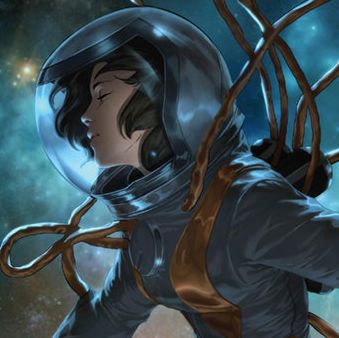
The basic pitch of the Valiant Entertainment comics series Divinity can be boiled down to the following idea: What if God were a communist? The first volume of Divinity came out last year and followed the story of a black Russian named Abram Adams, an orphan left at the doorstep of a Communist Party official in 1941 and trained to become a cosmonaut. He and a small crew are sent on a secret mission to explore the farthest reaches of the cosmos, and the process leaves him fundamentally changed. When he returns to Earth in the present day, he has the ability to warp reality ÔÇö an ability that makes him dangerous in the eyes of ValiantÔÇÖs universe of superheroes. The resulting story was as thrilling as it was narratively inventive, hopscotching back and forth through AdamsÔÇÖs unusual life and his conflict with ValiantÔÇÖs premier superteam, Unity.
Now the world of Divinity will get some new wrinkles in time, thanks to Divinity II, a sequel that debuts in April. It will feature another member of AdamsÔÇÖs crew ÔÇö one who took a very different path with her powers. WeÔÇÖve got exclusive pages from the first issue, as well as a conversation with the seriesÔÇÖ writer, Matt Kindt. He talked about the virtues of the Soviet system, the free-associative origins of the comic, and the ever-expanding Valiant universe.
How did the original Divinity series come about? Who pitched whom, and what was the pitch?
Warren, my editor, called me up one afternoon ÔÇö I was actually on the road to Charlotte for HeroesCon. We were talking story stuff, and towards the end of the phone call, he kind of laughs and tells me he has a story idea for me if I want it. ÔÇ£Sure,ÔÇØ I say ÔÇö never one to turn down a free idea. ÔÇ£Divinity,ÔÇØ he says. ThereÔÇÖs a long pause. ÔÇ£ThatÔÇÖs it?ÔÇØ I say. ÔÇ£Yeah, thatÔÇÖs all I got,ÔÇØ he says. Hmm. Okay, Warren. You keep editing, and IÔÇÖll keep writing. [Laughs.]
But as I kept driving, that word just became kind of evocative ÔÇö and I was struggling at the time with coming up with an opponent that was worthy of a superteam like Unity. All those powered heroes are kind of wasted on your run-of-the-mill terrorists and bank robbers. So I started thinking about ÔÇ£DivinityÔÇØ ÔÇö what kind of character would that be? Maybe this is the antagonist that would be worthy of a superteam. It all sprang from that. I was trying to come up with this character that would have enough power that heÔÇÖd be dangerous ÔÇö so I just gave him all the powers. Anything. He could do it all. Which is kind of scary, when I started thinking about it.
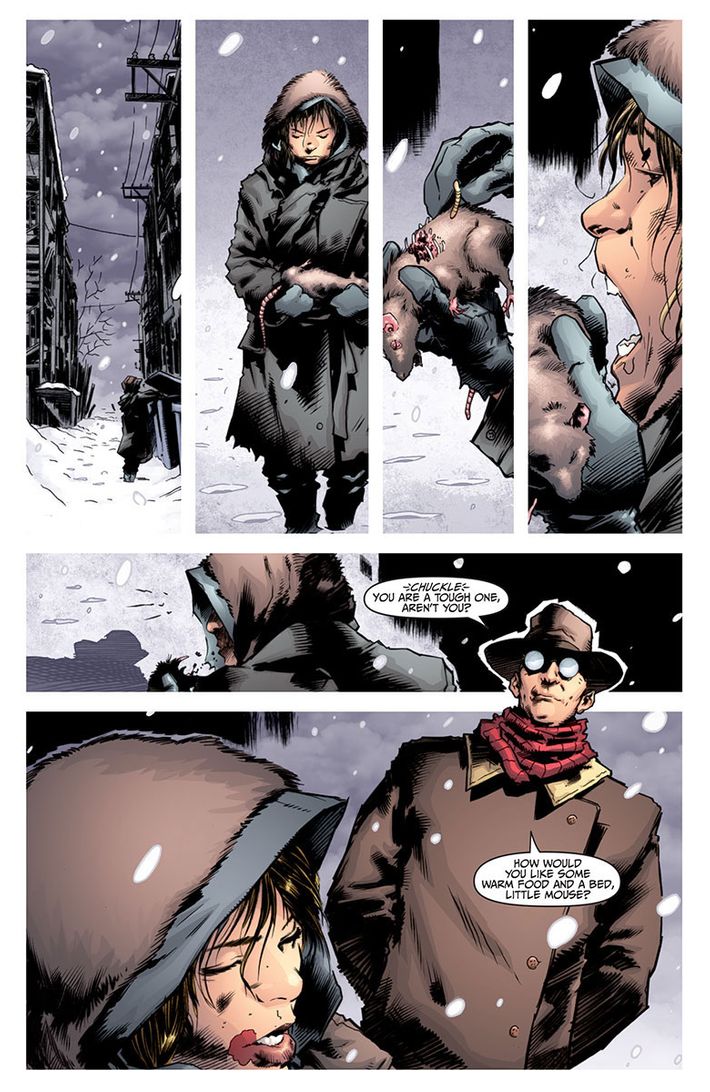
How did the first volume evolve during the process of creating it? Did you surprise yourself with how it was playing out on the page?
Yeah, for sure. He started out as the next story arc in the┬áUnity┬áteam series ÔÇö a character that the team would have to come in, fight, and contain. But as I started writing it and turning in my outline for the series, Warren and the guys at Valiant saw something in it. It was much bigger than anyone really thought it would be. The character of Divinity sort of took over ÔÇö he really was kind of all-powerful, in that way. He didnÔÇÖt want to be contained in a four-issue story arc, you know?
I think he was the first whole-cloth new character that was introduced in this new Valiant universe, so it morphed into something really special. I grew to really love the character, and he was unique in so many ways ÔÇö so unlike anything IÔÇÖd done before, and unlike anything that was currently in the Valiant U. Or any universe, for that matter. Which is funny in hindsight, because I started out trying to make this ultimate antagonist, but over the course of writing it, he turned into something else. He had compassion and heart and understanding. He might be an antagonist in someone elseÔÇÖs story, [like] Unity ÔÇö but heÔÇÖs the protagonist in his own story, like any great villain or hero.
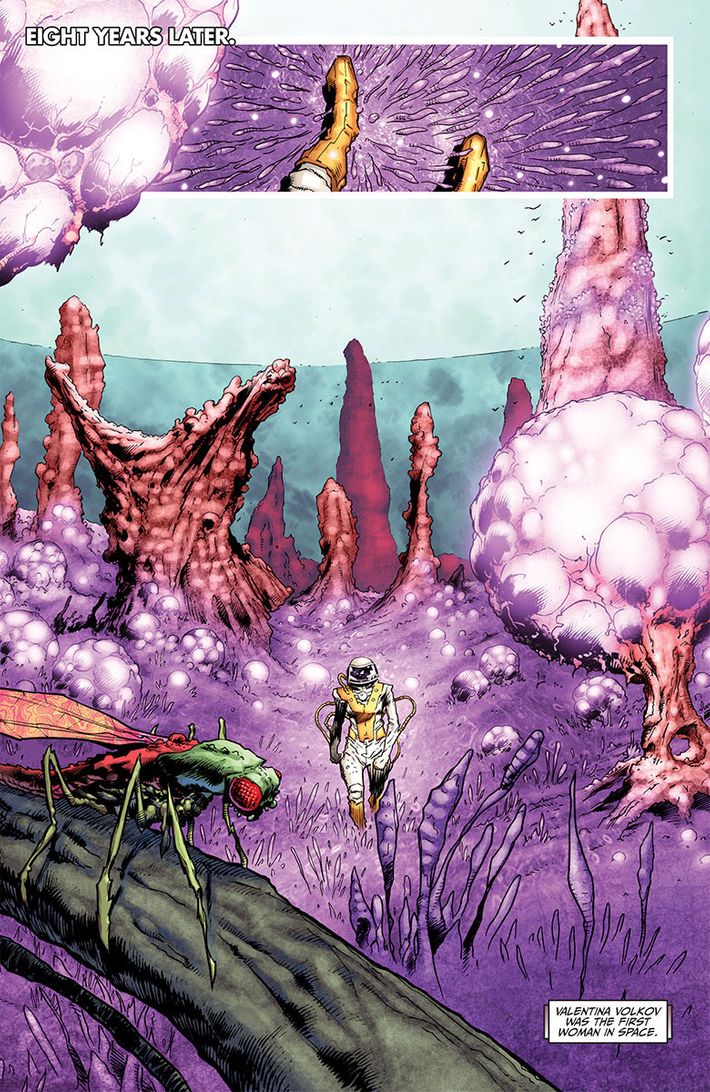
At what point did you all decide to do Divinity II, and why?
Almost immediately after IÔÇÖd written the first one. I wrote an alternate ending to the last issue that teased out the extra stories IÔÇÖd had in my outlines. A bigger story that expanded on a lot of the themes and characters IÔÇÖd set up in the first series. Most of the sequel stuff was in my original pitch, but it just wouldnÔÇÖt fit, you know? It was too big of a story. And at the time I wrote it, no one had read the first series. If it didnÔÇÖt catch on, then we wouldnÔÇÖt get the rest of the story, probably. But Valiant really believed in the character and the story, and got behind it ÔÇö got great artists and colorists and amazing covers. And readers really responded to it. So my alternate ending to convince Valiant to do a sequel wasnÔÇÖt really needed. Everyone wanted more ÔÇö it took no convincing.
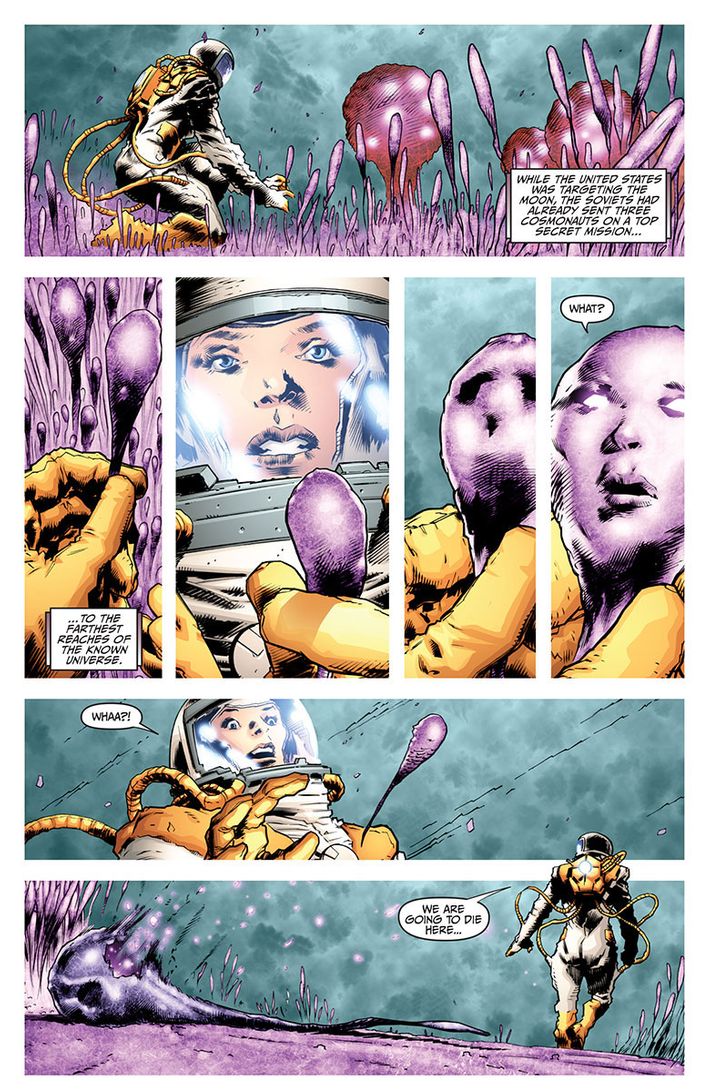
What was admirable to you about the Soviet Union? YouÔÇÖre someone who has thought a lot about history and Eastern Bloc spycraft, so IÔÇÖm curious about your take on the lost Soviet Empire.
I did a lot of research about the history of the government and the space program in particular. The Science Museum in London had a great exhibit with artifacts and material from the Russian space program that was also really inspiring. What was interesting to me was that while the government was so oppressive, there was still this underlying curiosity and desire to explore that is just basic to the human race. The by-product of the single-mindedness of the government was that they were much less racist and sexist in many regards. The first woman in space was a Russian. The experience of a black man wasnÔÇÖt the same in the Soviet Union as it was in America. The history there was different, and as a result, a black man or a woman could realistically rise to prominence in a space program in a time that American history was dominated by white males. So they were strangely progressive in many areas, which doesnÔÇÖt absolve them of other human-rights issues theyÔÇÖve had. But itÔÇÖs interesting to read and think about, for sure.
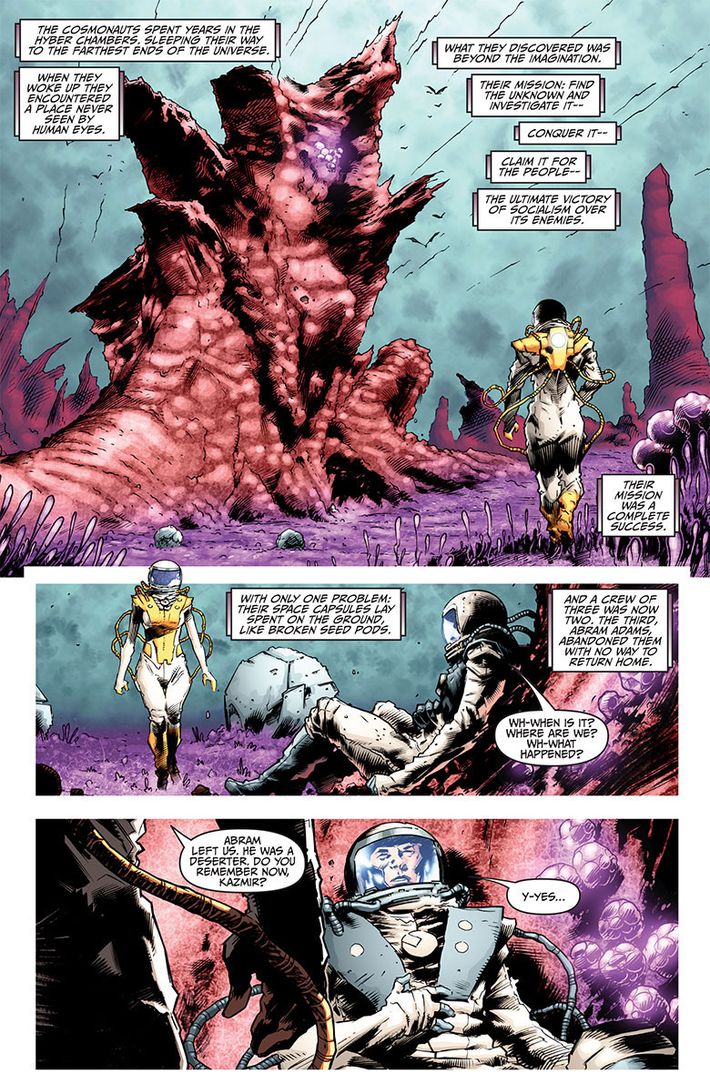
How will Divinity II differ from the first volume?
The focus will shift slightly to the two members of DivinityÔÇÖs crew that were left in space at the end of the first arc. Especially the woman that went with him ÔÇö and her struggle to survive and return to Earth. She is not happy about what happened. WeÔÇÖll see things from her perspective that will really inform our opinion of Divinity and what he did in the first series.
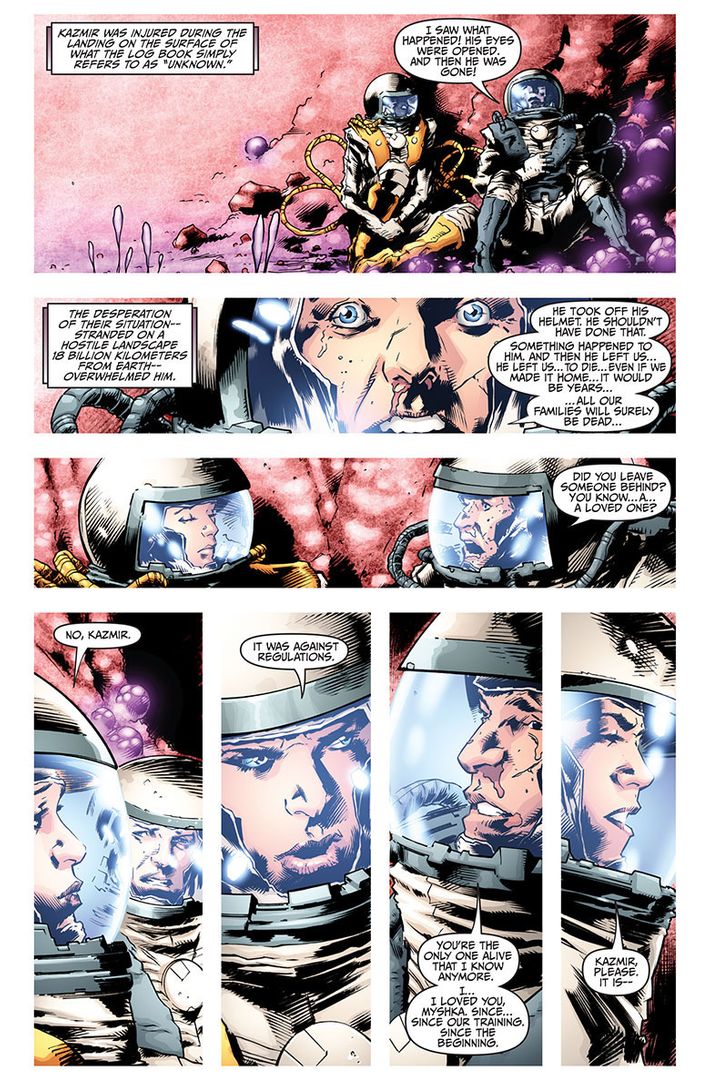
To what extent did similar unstuck-in-time narratives like Slaughterhouse-Five and Watchmen influence the disjointed narrative of the two Divinity series?
ItÔÇÖs a kind of storytelling I fell in love with a long time ago ÔÇö reading Joseph HellerÔÇÖs Catch-22 when I was much younger and more impressionable. IÔÇÖve never been able to shake the idea of all these different moments in time existing simultaneously and then picking and choosing the order in which we view them. Comics is the ideal medium for doing that ÔÇö every comic actually does this by default. You consciously have to a pick a moment in time to put in each panel. Then you set them side by side, but youÔÇÖre also seeing the entire page all at once. Time is a strange thing in comics. ItÔÇÖs unlike any other medium ÔÇö including movies and books, which propel you forward and discourage flipping back or looking ahead. With comics, you canÔÇÖt control what the reader is going to do. You can suggest a way to read it, but itÔÇÖs really up to the reader to comply with your suggestion. ItÔÇÖs that kind of idea that keeps me interested in comics as a medium, and with Divinity and his characterÔÇÖs love for pulp fiction, it really made it fun to twist knob on that idea up to 11.
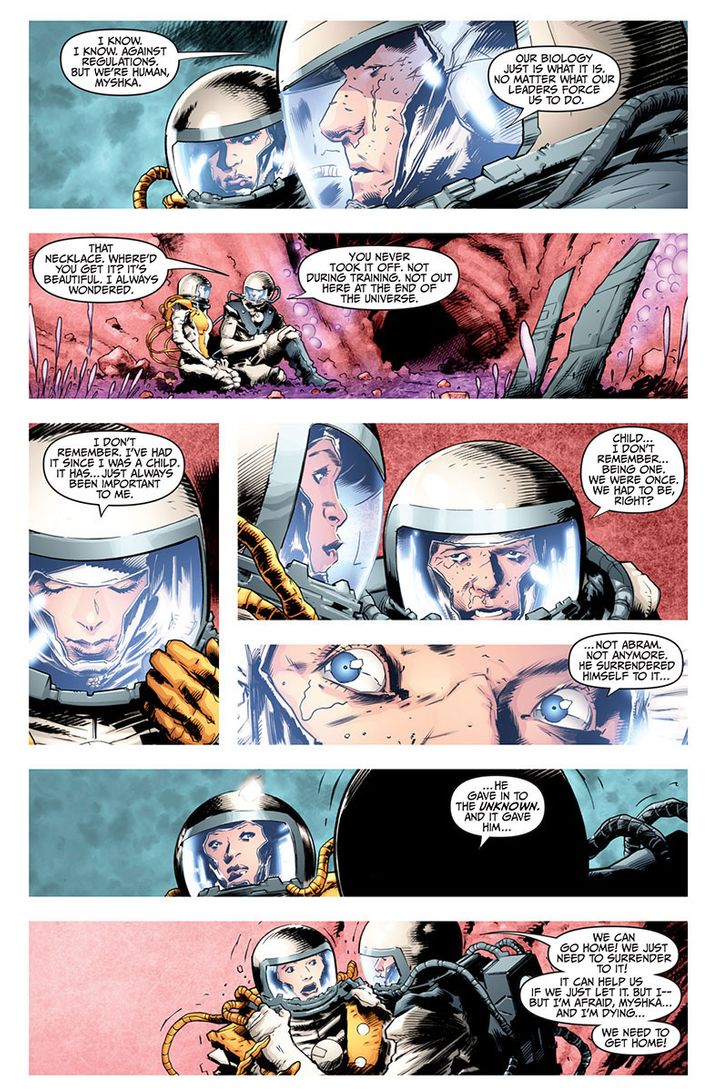
YouÔÇÖve been part of the Valiant universe for a number of years now. How has it evolved, and what has surprised you?
I think itÔÇÖs unique in comics. Only the birth of Marvel Comics in the ÔÇÿ60s is anything close to what IÔÇÖve witnessed over the last couple of years. WeÔÇÖre seeing new ideas and fresh characters growing and evolving organically with a small group of writers and artists working together and playing off of each other. That just isnÔÇÖt done anymore [elsewhere]. Events and story ideas come about naturally based on whatÔÇÖs happened before. ItÔÇÖs not driven by marketing or movies or anything outside of what is happening on the page. IÔÇÖve always idealized what it must have been like when Stan [Lee] and Jack [Kirby] were churning out new ideas one after the other back in the day. How great was that time? And did they realize what they were doing? It feels like that now with Valiant. IÔÇÖm lucky to be in on it.
